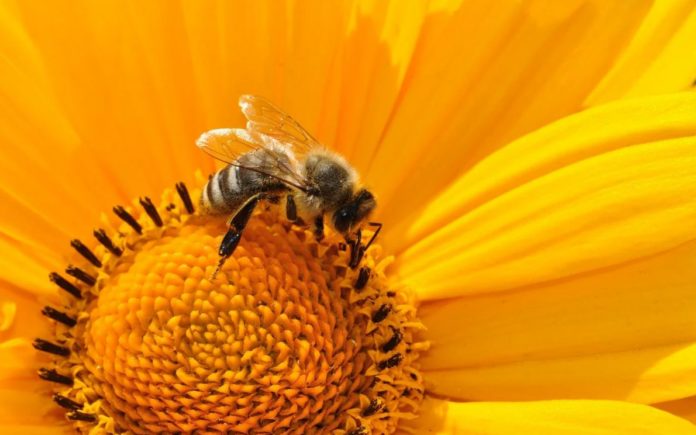This 2020 has been complicated, marked by the presence of COVID-19 and all its implications, but humanity has other very serious problems, such as the possible extinction of bees, something that could end existence itself of the human being.
The global decline in bee populations—mainly because of man’s action—poses a serious threat to a wide variety of plants that are critical to our well-being and livelihoods, something the Food and Agriculture Organization of the United Nations (FAO) warned last year, based on data available in the United States and Europe.
“Bees, which are among the most laborious creatures on the planet, have been benefiting people, plants and the environment for centuries. By transporting pollen from one flower to another, bees and other pollinators not only enable the production of an abundance of fruits, nuts and seeds, but also more variety and better quality, thus contributing to food security and nutrition,” FAO said on World Bee Day on May 20.
He added that “countries should do more to safeguard key allies in the fight against hunger and malnutrition.”
The UN agency recalls that “some pollinators such as bees, birds and bats affect 35% of the world’s agricultural production, increasing the production of 87 of the world’s major food crops, and many plant-derived medicines. 75% of crops around the world that produce fruits or seeds for human use as food depend, at least in part, on pollinators.”
- Scientists in Fear of This New Predator From Red Sea Eating Native Species in Mediterranean
- Does This Mean We Stopped Being Animal and Started Being Human Due to ‘Copy Paste’ Errors?
- The One Lifestyle Choice That Could Reduce Your Heart Disease Risk By More Than 22%
- Aging: This Is What Happens Inside Your Body Right After Exercise
- Immune-Boosting Drink that Mimics Fasting to Reduce Fat – Scientists ‘Were Surprised’ By New Findings
Man its great enemy
Modern agriculture, in trying to eradicate insects, has caused bee colonies to disappear completely. The UN on its website stresses that the number of bees and other pollinators is shrinking in many parts of the world “due in large part to intensive agricultural practices, monoculture, overuse of pesticides, loss of biodiversity, pollution and higher temperatures associated with climate change, which affect not only crop yields but also nutrition.”
“If this trend continues, more and more nutritionally rich crops such as fruits, nuts and many vegetables will be replaced by staple crops such as rice, corn and potatoes, which could lead to an unbalanced diet,” emphasizes the text.
In recent years large populations of bees have disappeared, in Europe, up to 30% per annum, and in the US up to 37% of honey bee colonies in a single year.
To highlight the immense work done by bees, since 2018 their world day is celebrated every May 20, a date that coincides with the birthday of Anton Jansa, a pioneer of modern beekeeping in Slovenia.
“The absence of bees and other pollinators would eliminate coffee, apples, almonds, tomatoes, and cocoa, to name just a few of the crops that depend on pollination. Countries must shift to friendlier food systems and policies and more sustainable for pollinators”, highlighted by the Former Director-General José Graziano da Silva in 2019, and urged everyone to take respectful and protective measures towards these pollinators, including “growing flowers at home to feed bees”.
According to experts, the biggest threat to these insects are:
- the loss of their natural habitat,
- climate change,
- the poor agricultural practices.
- reduction of forest area
Taking care of bees is taking care of the world
Although in some countries the phrase ‘work like a mule’ is used, the truth is that if you want to emphasize that you work a lot you should say that you do like a bee. These insects can visit up to 2,000 flowers in a day and on average travel about 800 kilometers in their lifetime.
Beyond wheat, rice and corn that are pollinated by the wind, all other foods that provide nutrients depend on bees for reproduction. FAO stresses that there are 100 crop species that provide 90% of food worldwide, and 71 of them are pollinated with bees. In Europe alone, 84% of the 264 crop species and 4,000 plant varieties exist thanks to bee pollination.
“The lack of bees would cause a cascade effect: if we do not have seeds we would not have grass, flowers, fruits, or animals that feed on fruit. Bees and other pollinators play a fundamental role in regulating ecosystems,” Carolina Starr, consultant on Biodiversity and Ecosystem Services at FAO, told BBC.
In order to save bees, which is also to save the world, measures are already being taken in Europe such as totally banning the outdoor use of three neonicotinoid insecticides widely used throughout the world in corn, cabbage, cotton and sunflower crops.
Each person can also help by fighting climate change and pollution. Also with the planting of flowers, and the most daring could practice urban beekeeping, which is common in many places. It is vital to contribute to the care of these wonderful insects that are so important to life on earth.
